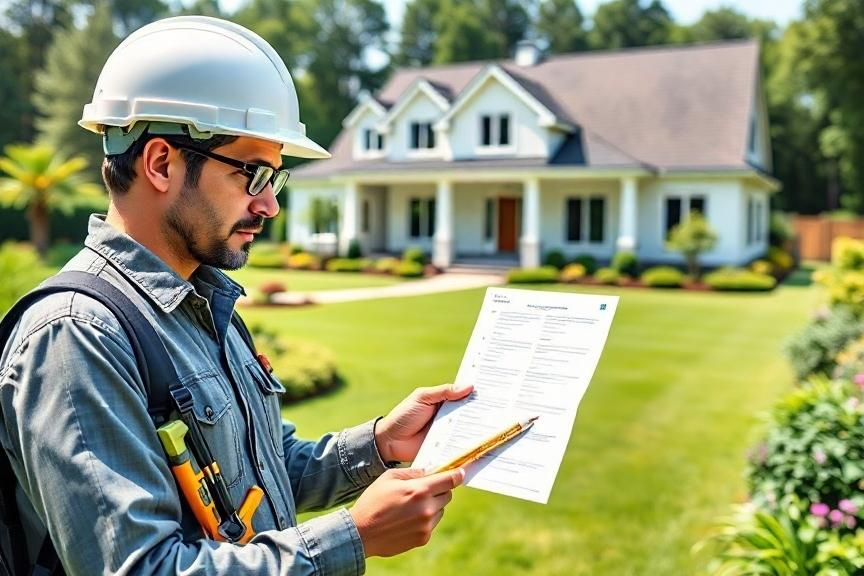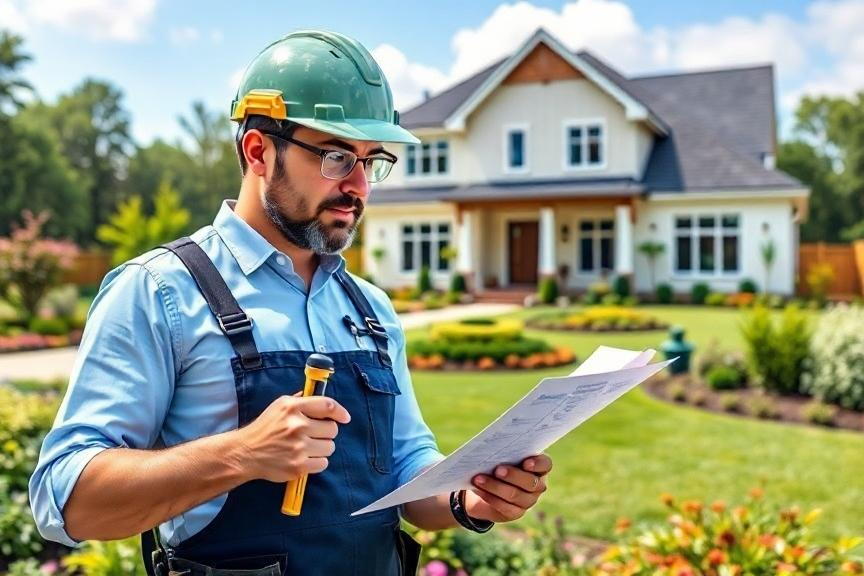Pre-Purchase Home Inspection in New Zealand: Essential Guide for Home Buyers
When buying a home in New Zealand, one of the most crucial steps is to conduct a pre-purchase home inspection. This detailed assessment not only uncovers potential issues but also ensures that you are making a sound investment. In this article, we will explore everything you need to know about pre-purchase home inspections in New Zealand, including their benefits, what to expect during the process, and how to choose the right inspector. Whether you’re a first-time home buyer or an experienced investor, this guide will equip you with the knowledge to navigate your home buying journey with confidence.

What is a Pre-Purchase Home Inspection?
A pre-purchase home inspection is a thorough examination of a property’s condition prior to finalizing a sale. The main purpose is to identify potential structural or maintenance issues that could lead to costly repairs down the line. It’s essential for anyone looking to buy a home, as it provides critical insight into the property’s condition and helps in making an informed decision.
Definition and Purpose
In simple terms, a pre-purchase inspection is a detailed assessment carried out by a qualified inspector to evaluate the condition of a property. By examining the home’s structure, systems, and components, inspectors can identify any significant defects or maintenance needs that may not be immediately visible to the untrained eye.
Who Should Get One?
Anyone looking to buy a home in New Zealand, whether it’s your first home or an investment property, should consider getting a pre-purchase inspection. This step can save you from unexpected repairs and financial headaches in the future.
Benefits of a Pre-Purchase Home Inspection
One of the primary benefits of a pre-purchase inspection is avoiding unexpected costs. Many buyers have saved thousands by addressing issues before the sale is finalized. Moreover, having a detailed report can give you leverage in negotiations, allowing you to request repairs or adjust the price accordingly.
Avoiding Costly Surprises
Investing in a pre-purchase inspection can help you avoid significant, unforeseen expenses. Common issues such as electrical faults, plumbing leaks, or structural damage can lead to thousands of dollars in repairs if not identified early. With a thorough inspection report, you can make an informed decision about whether to proceed with the purchase or negotiate repairs with the seller.
Negotiating Power in Purchase Price
A well-documented inspection report can serve as a powerful tool in negotiations. If the inspector uncovers significant issues, you can use this information to request repairs or adjust the purchase price, ensuring you’re not overpaying for the property.
What to Expect During the Inspection
Understanding what to expect during a home inspection can help you prepare and feel more confident about the process.
Common Areas Inspected
During an inspection, various areas are examined, including:
- Roof: Inspectors check for missing shingles, leaks, and overall condition.
- Foundation: Signs of cracks or settling are evaluated to ensure structural integrity.
- Plumbing: All plumbing fixtures, including pipes and drainage systems, are inspected for leaks and functionality.
- Electrical Systems: Wiring, outlets, and breaker panels are assessed to ensure safety and compliance with building codes.
- HVAC Systems: Heating and cooling systems are checked for functionality and maintenance needs.
Duration and Reporting
Most home inspections last between 2 to 4 hours, depending on the size of the property and the number of issues found. After the inspection, you will receive a detailed report outlining any findings, along with photographs and recommendations for repairs.

Choosing the Right Home Inspector
Selecting a qualified and experienced home inspector is crucial for a thorough evaluation.
Qualifications to Look For
When choosing a home inspector in New Zealand, consider the following qualifications:
- Qualification and Certification: Ensure the inspector is qualified and certified to perform inspections in New Zealand.
- Experience: Look for an inspector with several years of experience in the industry, particularly in the type of property you are purchasing.
- References and Reviews: Check online reviews and ask for references to gauge the inspector’s reputation and reliability.
Questions to Ask
Before hiring a home inspector, ask them the following questions:
- What is your inspection process?
- Can you provide a sample report?
- How long will the inspection take?
- Are you familiar with the specific issues that may arise in the area where the property is located?
Costs Involved in Home Inspections
The cost of a pre-purchase home inspection can vary based on several factors.
Average Prices in New Zealand
In New Zealand, you can expect to pay between $400 to $900 for a pre-purchase home inspection. The price often depends on the property’s size, location, and complexity. Larger properties or homes with unique features may incur higher inspection fees.
Factors Affecting the Cost
Several factors can influence the cost of a home inspection, including:
- The inspector’s experience and qualifications
- The age of the property
- Accessibility of various areas (e.g., attic, crawl spaces)
Common Findings in Home Inspections
Being aware of common findings can help you better understand the inspection process and prepare for potential repairs.
Structural Issues
Many home inspections uncover structural problems such as foundation cracks, sagging roofs, or termite damage. Addressing these issues promptly is vital to maintaining the property’s value and safety.
Electrical and Plumbing Concerns
Deficiencies in electrical systems, such as outdated wiring or insufficient outlets, can pose safety hazards. Similarly, plumbing issues like leaks or corroded pipes can lead to significant damage if not addressed.
Case Studies: Real-Life Examples
Success Stories
Many home buyers have benefited from pre-purchase inspections. For instance, one couple discovered extensive water damage during their inspection, leading them to renegotiate the purchase price significantly. They went on to make necessary repairs before moving in, saving them thousands.
Lessons Learned
Conversely, there are cases where buyers skipped the inspection only to find major problems after purchase. These situations highlight the importance of investing in a thorough inspection before finalizing any home purchase.
The Role of Home Inspections in Healthy Homes Standards
Understanding how home inspections relate to the Healthy Homes Standards is crucial for buyers looking to ensure their new home meets health and safety guidelines.
Overview of Healthy Homes Standards
The Healthy Homes Standards set minimum requirements for rental properties in New Zealand, focusing on aspects like heating, insulation, and ventilation. These standards aim to ensure that homes are warm, dry, and safe for occupants.
How Inspections Help
A pre-purchase home inspection can help identify whether a property complies with Healthy Homes Standards, ensuring that you invest in a home that contributes to your well-being. Inspectors can evaluate insulation levels, heating sources, and ventilation systems to ensure they meet the minimum requirements.
Preparing for Your Home Inspection
Preparation is key to maximizing the benefits of a home inspection.
Checklist for Home Buyers
Here’s a simple checklist to prepare for your home inspection:
- Confirm the inspection date and time with your inspector.
- Prepare a list of questions or concerns about the property.
- Be present during the inspection to gain firsthand knowledge.
- Review the inspector’s report carefully after the inspection.
What to Discuss with Your Inspector
Don’t hesitate to ask your inspector about any specific concerns you have or areas you want them to focus on. Open communication can lead to a more thorough inspection and better understanding of the property’s condition.
Conclusion
In conclusion, a pre-purchase home inspection is an invaluable step in the home-buying process in New Zealand. It not only protects your investment but also empowers you with the knowledge to negotiate effectively. By understanding the inspection process and choosing the right inspector, you can avoid costly surprises and ensure your new home is safe and sound. If you’re ready to take the next step in your home buying journey, consider contacting a reputable home inspection service today. Don’t leave your future to chance—ensure your new home is a safe haven for you and your family!
FAQs
Question: What is the cost of a pre-purchase home inspection in New Zealand?
Answer: The cost typically ranges from $400 to $900, depending on the property’s size and location. Many factors can influence the price, including the inspector’s experience and the complexity of the building.
Question: How long does a home inspection take?
Answer: Most home inspections last between 2 to 4 hours, depending on the size of the property and the number of issues found.
Question: What should I do if I find issues during the inspection?
Answer: Discuss the findings with your inspector and consider renegotiating the purchase price or requesting repairs from the seller.
Question: Can I attend the home inspection?
Answer: Yes, it’s recommended to be present during the inspection to ask questions and gain firsthand insight into the property’s condition.
Question: What qualifications should I look for in a home inspector?
Answer: Look for licensed and certified inspectors with several years of experience and positive reviews from previous clients.

